MEET SOME OF OUR NEW IGERT STUDENTS...
Chisom Amaechi
At Carnegie Mellon University I double majored in Chemical Engineering and Engineering & Public Policy (EPP) and received my B.S. in May of 2009. My collegiate experience at Carnegie Mellon fostered my interest in alternative energy and sustainability.
The major deciding factor for my decision to attend the University of Delaware for Chemical Engineering was the opportunity to participate in the IGERT program. With my double major in EPP, I experienced a lot of interdisciplinary work and have grown to appreciate and love its worth. It’s so important that academia produces well rounded graduates, because it is going to be those graduates who shape the future of the world and if we aren’t able to collaborate with people from various backgrounds, the consequence could be that pertinent policy changes aren’t implemented, resulting in a very unsustainable future. IGERT paves the way for a sustainable future by developing well-rounded innovators and leaders who will be equipped to solve the future problems plaguing the earth. Graduates from this program will realize the importance and necessity for the involvement of people from different areas of expertise across the globe; so that together we can ensure a sustainable future on earth for generations to come.
The summer before my senior year of college, I was fortunate to be a part of the International Association for the Exchange of Students for Technical Experience (IAESTE) program called EMPOWER: Engineering for a Sustainable Future. In this program I learned more about the policy and technical side of renewable energy, its use specifically in Brazil and about Brazilian culture. The program culminated with a trip to Brazil where we met with professors and their graduate students at UNICAMP, the state university of Campinas, and viewed a lot of Brazil’s alternative energies in person. It was through this experience in the EMPOWER program and my industry internships that I realized in order to achieve my goals; I’d need to further my education and conduct meaningful research. This lead me to graduate school with hopes of receiving a PhD in Chemical Engineering , having conducted my thesis research in solar energy and having learned more about sustainable energy and environmental issues. Through my participation in IGERT I am certain that I will be prepared for whichever direction I choose to follow be it in academia or in industry.
When I’m not busy PhD-ing, I LOVE to: play volleyball, wallyball (which I have recently been introduced to since my arrival to DE), spend time with my family and close friends, study the Bible, learn about and experience different cultures, learn more about environmental issues, give back to my community, smile, etc.
John Bedenbaugh
The development of a more sustainable energy system is a unique challenge facing our society. This issue bears a worldwide scope, reflected in the devastating economic, political, and environmental repercussions associated with current dependence on nonrenewable energy sources. Unfortunately, implementation of a practical alternative has thus far proven elusive. I believe solar hydrogen technology offers a promising opportunity for advancement, and I relish the opportunity to begin working on this difficult challenge in earnest as a member of the Solar Hydrogen IGERT program here at the University of Delaware.
I received a B.S. degree in Chemical Engineering from the University of South Carolina in May 2007. Undergraduate research experience with PEM Fuel Cells provided an avenue for my interest in alternative energy and introduced me to working with energy technology in an academic setting. I participated in NSF REU summer programs at North Carolina State University and the University of Colorado as an undergraduate, focusing on green processing and functional materials. I also garnered three semesters of work experience as a co-op at Kerr-McGee/Tronox Pigments, Inc. in Savannah, GA, where I gained valuable insight into the connections between industry and the environment, both locally and on a broader scale.
Outside of my academic pursuits, I am a diehard Gamecock football, basketball, and baseball fan. I am an intramural enthusiast, casual musician, and am working on my tennis game.
Cory Budischak
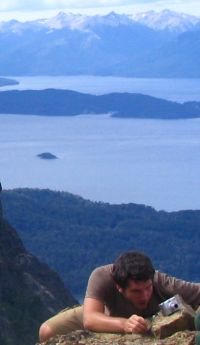 In order to sustain our way of life our generation must find a new energy source. Not just because of environmental concerns but because of availability of traditional energy sources. Society must switch to renewable energy sources before we deplete our reserves of fossil fuels or irreversibly change our environment. Solar power could be one such energy source. However, one problem with solar power is that it only generates power when the sun is shining. Therefore, society must find a way to store this energy to use it when we need it. I believe hydrogen is the medium to store this energy which is why I am excited to become involved in this program.
In order to sustain our way of life our generation must find a new energy source. Not just because of environmental concerns but because of availability of traditional energy sources. Society must switch to renewable energy sources before we deplete our reserves of fossil fuels or irreversibly change our environment. Solar power could be one such energy source. However, one problem with solar power is that it only generates power when the sun is shining. Therefore, society must find a way to store this energy to use it when we need it. I believe hydrogen is the medium to store this energy which is why I am excited to become involved in this program.
I received my undergraduate degree in Electrical Engineering from the University of Delaware in May 2007. I am also from Delaware so I hope to bring my knowledge of the state to take part in outreach programs around the area to help teach people about this subject. My research focuses primarily on novel ideas to increase electrolysis efficiency and constructing a solar hydrogen powered golf cart.
If I am not studying at the University I can usually be found on a volleyball court or playing ultimate frisbee.
Laura Cassels
 I was born and raised in the south, and in 2007, I graduated from Roanoke College in the town of Salem, VA with a B.S. in Physics and a Math minor. During my time at this small liberal arts college, I was fortunate enough to study abroad in Italy, and upon graduating, without much sense of direction professionally, I seized the opportunity to move to another city in Italy and work as an English teacher for a year before moving on to graduate school.
I was born and raised in the south, and in 2007, I graduated from Roanoke College in the town of Salem, VA with a B.S. in Physics and a Math minor. During my time at this small liberal arts college, I was fortunate enough to study abroad in Italy, and upon graduating, without much sense of direction professionally, I seized the opportunity to move to another city in Italy and work as an English teacher for a year before moving on to graduate school.
Stepping back from academia afforded me the time and place to decide what I wanted to do with my life and why I should go to grad school. While in the states I never thought much about sustainability - in fact, I didn't really even know what that word meant - but it was actually the Italians who taught me its value. Since Italy is already exceptionally crowded (and has been for the last 1000 years) with its urban centers packed tightly within a boot-shaped peninsula, the country has been dealing with sustainability issues for quite a while now. While in America we've got plenty of open land and air space to spare, issues such as pollution and trash disposal are much bigger problems within such a limited space as Italy. I saw that Italians and other Europeans have genuinely got their act together when it comes to recycling, car usage regulations and emission standards, public transportation, etc., and it soon became clear to me that we don't need to live a life of indulgence and wastefulness when we are so quickly destroying our habitat and risking our safety and future.
Reflecting on the lack of any such sustainably-minded structures in my mid-sized Virginian city, I decided to devote my career to bringing this mindfulness to my country by helping to developing clean energy solutions as a research engineer. At the University of Delaware, I joined the Electrical Engineering department and the Solar Hydrogen IGERT, the perfect outlet to share my passion with like-minded students and faculty. Working with my materials science advisor, Dr. Joshua Zide, my research will center around creating new materials for use in more efficient thermoelectric devices, which serve the purpose of converting waste heat back into electricity, lengthening the life of a device and saving electricity.
In addition to pushing my sustainability idealism onto my family and friends, I spend my time traveling, learning languages, studying the Bible, cooking, taking pictures, and being opinionated.
Beth Cheney
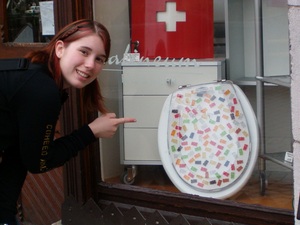 I attended the University of Connecticut for my undergraduate education and received a B.S. in chemical engineering and a B.A. in German studies in May 2008. This unique pairing of language and engineering took me to Frankfurt am Main, Germany to perform research during the summer of 2007. A student of the Honors program, my thesis topic pursued the optimization of the catalyst in PEM fuel cells. Working with fuel cells sparked my interest in alternative energy and ultimately led to my decision to further my education and strive towards a future that is no longer dependent on depleting resources. My decision to attend the University of Delaware for my PhD in chemical engineering was heavily influenced by the IGERT program. A program that focuses not only on developing new approaches to sustainable energy but also on addressing the social, economical, and political impacts of implementing these energy sources is an incredibly unique opportunity. I am confident that IGERT will be an educational and rewarding experience that will give me the tools I need to contribute to the world's determination to transition from a reliance on depleting resources to the global use of clean, renewable energy.
I attended the University of Connecticut for my undergraduate education and received a B.S. in chemical engineering and a B.A. in German studies in May 2008. This unique pairing of language and engineering took me to Frankfurt am Main, Germany to perform research during the summer of 2007. A student of the Honors program, my thesis topic pursued the optimization of the catalyst in PEM fuel cells. Working with fuel cells sparked my interest in alternative energy and ultimately led to my decision to further my education and strive towards a future that is no longer dependent on depleting resources. My decision to attend the University of Delaware for my PhD in chemical engineering was heavily influenced by the IGERT program. A program that focuses not only on developing new approaches to sustainable energy but also on addressing the social, economical, and political impacts of implementing these energy sources is an incredibly unique opportunity. I am confident that IGERT will be an educational and rewarding experience that will give me the tools I need to contribute to the world's determination to transition from a reliance on depleting resources to the global use of clean, renewable energy.
In addition to this aspiration to save the world, other long-term goals include completing Guitar Hero on Expert, traveling into space, visiting Tokyo, Japan, and speaking German fluently.
John Clinger
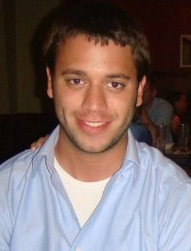 Renewable energy is an important emerging field that could very well become a strong pillar for creating a more stable and eco-friendly economy. It is important to tie in all aspects of science, policy and economics to help develop and promote cleaner energy solutions. While my research is focused in solar, I have a background in economics and a strong interest in the policy that dictates how these new technologies are adopted by our society. The IGERT program is a great opportunity for me to shift some focus onto these less technical aspects of renewable energy while still making progress in my research.
Renewable energy is an important emerging field that could very well become a strong pillar for creating a more stable and eco-friendly economy. It is important to tie in all aspects of science, policy and economics to help develop and promote cleaner energy solutions. While my research is focused in solar, I have a background in economics and a strong interest in the policy that dictates how these new technologies are adopted by our society. The IGERT program is a great opportunity for me to shift some focus onto these less technical aspects of renewable energy while still making progress in my research.
I attended the University of Delaware for my undergraduate education and received a B.S. in Computer Engineering with a minor in Economics in May of 2007. My undergraduate research focused on parallel computer architecture which shares many fundamental semiconductor principles with the solar technology that I currently study. My graduate research focuses on using InGaN photoanodes in photoelectrochemical cells to increase overall device efficiency.
When I do have some free time I enjoy a pickup game of football, watching any Philly sports team play, or finding time to escape to the shore on a sunny day.
Jeremiah Couey
 My undergrad degree (from Kansas State University) and my master’s degree (from Penn State University) are both in Mechanical Engineering - the professional area I had been working in for five years before joining the PhD program in Energy and Environmental Policy at UD’s Center for Energy and Environmental Policy. I was fortunate as an engineer to have worked in a multitude of industries, from natural gas and nuclear power to material science and the global semiconductor business - where I collaborated on 12 published papers, held a committee position on an ANSI/ASME standards committee, and also managed to submit a patent as the lead investigator for a novel semiconductor wirebonding accuracy system. This diversity of focus areas enabled me to meet a wide variety of people working to solve the myriad of social, ecological and political problems in the world. Along the way I had the opportunity for fun projects like counting growth rings on deep-sea coral (used to monitor ocean surface conditions) and also served as the chairperson of a small Pennsylvania borough’s environmental advisory council where I helped run a 300 volunteer tree planting event.
My undergrad degree (from Kansas State University) and my master’s degree (from Penn State University) are both in Mechanical Engineering - the professional area I had been working in for five years before joining the PhD program in Energy and Environmental Policy at UD’s Center for Energy and Environmental Policy. I was fortunate as an engineer to have worked in a multitude of industries, from natural gas and nuclear power to material science and the global semiconductor business - where I collaborated on 12 published papers, held a committee position on an ANSI/ASME standards committee, and also managed to submit a patent as the lead investigator for a novel semiconductor wirebonding accuracy system. This diversity of focus areas enabled me to meet a wide variety of people working to solve the myriad of social, ecological and political problems in the world. Along the way I had the opportunity for fun projects like counting growth rings on deep-sea coral (used to monitor ocean surface conditions) and also served as the chairperson of a small Pennsylvania borough’s environmental advisory council where I helped run a 300 volunteer tree planting event.
Becoming an IGERT affiliate offers me the opportunity to work with some of the best scientists and engineers seeking solutions for a sustainable energy future. As a policy affiliate, this allows me to help implement sustainable energy solutions that bridge the social and ecological difficulties of our modern energy system that seems disconnected to the social and ecological realities of a sustainable future. Understanding these technological systems also mirrors my dissertation topic – an attempt to characterize sustainable technology, both in the physical systems through society, but also in the way we organize and establish social institutions and connect community participation with democratic governance.
In leaving my engineering career path to jump into the realms of social inquiry and policy formation, perhaps Henry David Thoreau’s quote best signifies my pursuit of a sustainable future: “I went to the woods because I wished to live deliberately, to front only the essential facts of life, and see if I could not learn what it had to teach, and not, when I came to die, discover that I had not lived” (Walden, 1854)
Keith Douglass
As an undergrad I earned a B.S. in Chemistry and Biology and a minor in Economics. Before coming to graduate school at the University of Delaware I worked in the "real world" for two years. My first job was as a Chemistry and Fish Technician at Australis Aquaculture, a sustainable indoor fish farm. After that I got a job at a small start-up company doing research that used UV lasers to do things like break down environmental contaminants and to synthesize liquid fuels from gas sources. After funding for that company dried up I went to work for Evergreen Solar as a R&D Technician. Before working at Evergreen I had already began applying to graduate school that had good solar programs. I wasn't sure what I wanted to do, but knew that finding sources of renewable energy was the most important problem facing the world today. Evergreen Solar provided me a nice stepping stone into the solar energy world and I hope that this IGERT program and the University of Delaware will help me continue on that journey.
I am co-advised by Andrew Teplyakov (Chemistry) and Robert Opila (Material Science) and am in my second year as an IGERT student within the Chemistry Department. Currently my research focuses on the surface chemistry of solar cell materials/devices such as gallium nitride and indium gallium nitride films. Through my research I hope to gain the necessary set of tools and skills that will allow me to work on improving the future means of harnessing the world's energy in a sustainable way. I like the IGERT program because it won't let me loss sight of the bigger picture. As an IGERT student you get immersed in all kinds of things relating to energy. Sure we need new and advanced technologies, but without the knowledge and use of economics and policy many of these technologies will never be implemented. We also do a lot of outreach programs that helps to get the community and younger future generations involved. Our energy problem is huge and it is going to take the support of all people in all disciplines to solve.
Dan Esposito
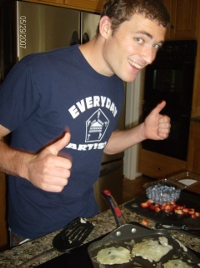 When I complete graduate school at the University of Delaware, I want to be involved with society’s transition toward a more sustainable energy system. The vagueness of my career objective is a reflection of my broad interest in this multi-faceted topic, which involves many technologcial, political and social challenges. For this reason I am very excited to be involved with the Solar Hydrogen IGERT progam, which focuses on the engineering aspects of developing sustainable energy but also provides exposure to the economic, political and social aspects of it.
When I complete graduate school at the University of Delaware, I want to be involved with society’s transition toward a more sustainable energy system. The vagueness of my career objective is a reflection of my broad interest in this multi-faceted topic, which involves many technologcial, political and social challenges. For this reason I am very excited to be involved with the Solar Hydrogen IGERT progam, which focuses on the engineering aspects of developing sustainable energy but also provides exposure to the economic, political and social aspects of it.
I received a B.S in Chemical Engineering from Lehigh University in the spring of ’06 and have continued my education in Chemical Engineering at the University of Delaware. Under the guidance of Dr Jingguang Chen and Dr Robert Birkmire, I am doing research on an alternative type of solar cell called a photoeletrochemical cell (PEC) that has the ability to convert sunlight into chemical energy in the form of hydrogen. With hydrogen being touted as the energy carrier of the future, its production from two abundant and carbon-free resources (water and sunlight) is an ideal solution to the world’s energy problems. Outside of research, I look forward to being invovled with outreach programs and workshops aimed at spreading knowledge about sustainable energy to high school teachers, studetns and the general public.
William Green
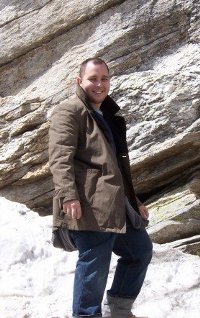 I received my B.S. in Chemistry from Rowan University in 2008. While at Rowan, I worked on a number of research projects including multiferroic materials for microelectronics, functionalized nanoparticles for drug delivery, and dye sensitized solar cells. My research took me all over the world, from the Indian Institute of Technology in Delhi, India to the National University of Singapore. Through my international travels I learned just how big energy problems have become in today's world and am convinced that it will take the ingenuity of all political and scientific disciplines to solve them.
I received my B.S. in Chemistry from Rowan University in 2008. While at Rowan, I worked on a number of research projects including multiferroic materials for microelectronics, functionalized nanoparticles for drug delivery, and dye sensitized solar cells. My research took me all over the world, from the Indian Institute of Technology in Delhi, India to the National University of Singapore. Through my international travels I learned just how big energy problems have become in today's world and am convinced that it will take the ingenuity of all political and scientific disciplines to solve them.
The IGERT program was a major factor in my decision to come to the University of Delaware, because it gave me the opportunity to take on some of these energy issues in unique and innovative ways. The IGERT program has allowed to me to broaden my research horizons, by both expanding on my background as a chemist and by allowing me to learn
from so many other disciplines. The heavily interdisciplinary approach that the IGERT program takes to research allows you to learn so much more than you would from the narrow confines of an individual branch of science.
With hydrogen power looking to be a bright alternative to fossil fuels, there is plenty of research on obtaining hydrogen in an inexpensive and environmentally friendly manner. While the emphasis of this IGERT is on photochemical hydrogen production, the other half of the water splitting reaction, namely, its oxidation to O2 is a central
focus of my studies. It is my goal to study this process by exploring various Ni based inorganic complexes in an attempt to lower the over-potential necessary to split water, and, in so doing, help make electrolysis a more energy efficient and economical method for
producing hydrogen.
Chelsea Haughn
 I grew up in northern Michigan and attended the University of Michigan for my undergraduate degree in Materials Science and Engineering. My undergraduate research with Professor Max Shtein began my interest in photovoltaic cells and organic electronics. I worked on pentacene transistors, CuPc photovoltaic cells and thermal conductivity in organic thin films.
I grew up in northern Michigan and attended the University of Michigan for my undergraduate degree in Materials Science and Engineering. My undergraduate research with Professor Max Shtein began my interest in photovoltaic cells and organic electronics. I worked on pentacene transistors, CuPc photovoltaic cells and thermal conductivity in organic thin films.
I chose the University of Delaware for my PhD because of the opportunities in research on solar cells and for the IGERT program. My research, under Professor Matt Doty, is using time resolved photoluminescence to understand the charge transport dynamics in polymer materials for photovoltaic cells. I am excited about the potential for low cost, high efficiency polymer photovoltaics that could be produced much faster and using less energy than traditional first and second generation cells.
My interests (read obsessions) outside academics are solar cells, cradle-to-cradle design, traveling the world and talking politics (I’ll argue with almost anyone and take almost any side). I read too much, talk too much, knit and crochet, and compete in triathlons when the weather is nice.
Elizabeth Huynh
 I completed my bachelor's degree at DePaul Unversity in physics and
chemistry, where I worked on arange of projects from doing optical
fiber simulations in MATLAB to growing single crystals of manganese
oxides for a summer REU at Montana State University. After I finished
my degree, I spent a year working on separate projects at Argonne and
Lawrence Berkeley National Laboratories in materials science and
environmental engineering respectively followed by a year of teaching
English abroad in southern France. At Berkeley, I met many
progressive thinkers who challenged the way I thought and I was really
inspired by some great lectures on renewable energy research. I
particularly recalled a lecture by the former Director of LBNL and now
Secretary of Energy, Dr. Steven Chu, which first sparked a serious
interest in doing renewable energy research for my graduate studies
which led me to to the University of Delaware's Solar Hydrogen IGERT
program. Here at the University of Delaware, I work at the Insititute
of Energy Conversion under the supervision of Dr. Birkmire studying
the material properties of CuInGaSe2 which can be used as the absorber
layer in a thin film solar cell.
I completed my bachelor's degree at DePaul Unversity in physics and
chemistry, where I worked on arange of projects from doing optical
fiber simulations in MATLAB to growing single crystals of manganese
oxides for a summer REU at Montana State University. After I finished
my degree, I spent a year working on separate projects at Argonne and
Lawrence Berkeley National Laboratories in materials science and
environmental engineering respectively followed by a year of teaching
English abroad in southern France. At Berkeley, I met many
progressive thinkers who challenged the way I thought and I was really
inspired by some great lectures on renewable energy research. I
particularly recalled a lecture by the former Director of LBNL and now
Secretary of Energy, Dr. Steven Chu, which first sparked a serious
interest in doing renewable energy research for my graduate studies
which led me to to the University of Delaware's Solar Hydrogen IGERT
program. Here at the University of Delaware, I work at the Insititute
of Energy Conversion under the supervision of Dr. Birkmire studying
the material properties of CuInGaSe2 which can be used as the absorber
layer in a thin film solar cell.
Dan Kasper
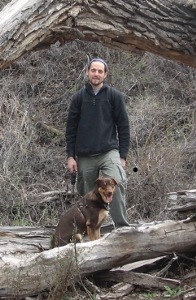 The world is a very complex place. For too long academia has largely ignored this fact as departments surrounded themselves with ivory walls of their own design, limiting their collaboration with other disciplines and often not engaging the world outside. Through my undergraduate education in Environmental Science (BS) at Penn State University, and Master’s program in Geography (MA) at the University of Denver, I came to realize that those in academia can most effectively help to solve modern society’s problems through a multidisciplinary approach and applied research. This is why I applied to the PhD program in Energy and Environmental Policy at UD’s Center for Energy and Environmental Policy, which is a research center that utilizes a multidisciplinary and collaborative policy-based approach in addressing a wide array of modern environmental and energy issues. After completing my first year in the program, my faith in the nature of CEEP’s program is strengthened, as is my belief that research regarding clean and renewable energy production and use is of paramount importance in a world that is so rapidly industrializing.
The world is a very complex place. For too long academia has largely ignored this fact as departments surrounded themselves with ivory walls of their own design, limiting their collaboration with other disciplines and often not engaging the world outside. Through my undergraduate education in Environmental Science (BS) at Penn State University, and Master’s program in Geography (MA) at the University of Denver, I came to realize that those in academia can most effectively help to solve modern society’s problems through a multidisciplinary approach and applied research. This is why I applied to the PhD program in Energy and Environmental Policy at UD’s Center for Energy and Environmental Policy, which is a research center that utilizes a multidisciplinary and collaborative policy-based approach in addressing a wide array of modern environmental and energy issues. After completing my first year in the program, my faith in the nature of CEEP’s program is strengthened, as is my belief that research regarding clean and renewable energy production and use is of paramount importance in a world that is so rapidly industrializing.
Becoming an IGERT affiliate is an exciting opportunity to explore the economic, policy, and social implications of the solar-hydrogen process. Few in my field are fortunate enough to be exposed to the level of technology and technological expertise that is found in the IGERT program, and its multidisciplinary approach is an important aspect of the program. Also, the focus of UD’s IGERT program, solar-hydrogen electricity, combines the most renewable energy resource on earth (solar energy) with one of the cleanest electricity-producing fuels known (hydrogen, which when used produces only pure water and heat as waste). Energy production is vital to economic and social development, yet lies at the heart of too many modern environmental and social problems. Solar hydrogen has the potential to be part of the solution that will decouple energy production from socio-environmental degradation.
My research focus is how to best integrate technological/non-technological and grassroots/top-down approaches to achieve more sustainable livelihoods in the United States, especially for low-income families and individuals. The IGERT program will be instrumental in this decidedly broad research topic (and perhaps will enable me to narrow it down).
When not driving myself crazy thinking about the gravity of the world’s problems, I can be found playing a variety of sports, working on the never-ending project/money pit that is my home, watching movies, sitting near a campfire in the woods (or my backyard), or wishing I was traveling abroad
Erik Koepf
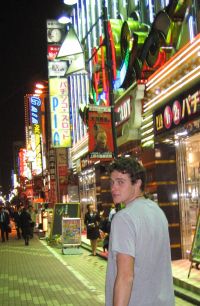 Hydrogen has a very critical and somewhat unique potential to bridge the gap between renewable energy sources and zero-emissions energy conversion technologies. Through the Fuel Cell group here in the Department of Mechanical Engineering, I will be researching solar-thermal hydrogen production from water. Using thermal energy from the sun, water can be split into its hydrogen and oxygen components. This hydrogen can then be used as fuel in a PEM (proton exchange membrane) fuel cell. Thus renewable energy and a very promising zero-emissions energy conversion technology are linked.
Hydrogen has a very critical and somewhat unique potential to bridge the gap between renewable energy sources and zero-emissions energy conversion technologies. Through the Fuel Cell group here in the Department of Mechanical Engineering, I will be researching solar-thermal hydrogen production from water. Using thermal energy from the sun, water can be split into its hydrogen and oxygen components. This hydrogen can then be used as fuel in a PEM (proton exchange membrane) fuel cell. Thus renewable energy and a very promising zero-emissions energy conversion technology are linked.
At times it is necessary to make ideal assumptions, and I sometimes choose to view the world today as a conservative energy system. Every force is derivable from a potential, every action is rendered from the potential to act. Hamilton’s Principle states that the path connecting any two states of a conservative system is such to minimize the difference between that action and the potential to act.
But this is not an ideal world, nor am I an idealist really; in some respects we are all only as capable as we are permitted to be. Sometimes people do not act, as members of a group, in accordance with what each feels as an individual; often each person feels as a function of the way in which they are permitted or obligated to act. The way in which people act and associate with one another is often restricted by social restraints, like the distribution of power, wealth, opportunity, education and awareness. Simple awareness could change the entire course of one’s life, just as ignorance is a powerful tool for those who could stand to benefit from people’s unawareness or misinformation. The concepts surrounding energy use are cloaked with unawareness, misinformation and thus, wasted potential.
I grew up in Half Moon Bay, CA and obtained an undergraduate degree in Physics from Occidental College in Los Angeles in 2004. I studied Mechanical and Energy Engineering at the University of Washington, Seattle, and at the University of New South Wales, Sydney AU. Before coming to the Department of Mechanical Engineering at the University of Delaware in 2006, I lived in Japan and Maine working on environmental and renewable energy awareness projects. I am an avid surfer and musician, and have been concerned with the protection, preservation and conservation of our environment for as long as I could spell those words. I am confident that the IGERT program will aid me in minimizing wasted potential in our world.
Nicole Kotulak
 I earned a Bachelor of Arts in Physics and a Minor in Mathematics from the College of Notre Dame of Maryland in May 2009. During my undergraduate career, I worked with my advisor on quantum theoretical modeling of Dipositronium – a matter-antimatter system of particles – which was presented at multiple conferences. I was also a member of the Morrissy Honors Program, which is an interdisciplinary program allowing students to take classes that are team taught by professors across two (or more) different departments. Experiencing a course on the Mind-Body Problem taught by both a Philosopher and a Psychologist, or Genethics taught through the eyes of Biology and Religious Studies truly opens your eyes to how interconnected – and sometimes mutually misunderstood – the various disciplines of academia can be. While an undergraduate student, I knew that a graduate career was in my future, but it would be for engineering. I, therefore, had an internship at a Civil Engineering firm over the span of two years. During this time, I gained experience from all levels of project development – from proposal writing, to design work and construction. It was through this experience that I found how important it is for people to be able to understand each other’s areas of expertise. Interdisciplinary approaches are not only useful in the classroom. They have the potential to revolutionize the workplace, as well. Now, add all of these experiences to my growing concern for the state of our world, the depletion of natural resources, and the apparent nonchalance with which these problems are approached by the world at large.
I earned a Bachelor of Arts in Physics and a Minor in Mathematics from the College of Notre Dame of Maryland in May 2009. During my undergraduate career, I worked with my advisor on quantum theoretical modeling of Dipositronium – a matter-antimatter system of particles – which was presented at multiple conferences. I was also a member of the Morrissy Honors Program, which is an interdisciplinary program allowing students to take classes that are team taught by professors across two (or more) different departments. Experiencing a course on the Mind-Body Problem taught by both a Philosopher and a Psychologist, or Genethics taught through the eyes of Biology and Religious Studies truly opens your eyes to how interconnected – and sometimes mutually misunderstood – the various disciplines of academia can be. While an undergraduate student, I knew that a graduate career was in my future, but it would be for engineering. I, therefore, had an internship at a Civil Engineering firm over the span of two years. During this time, I gained experience from all levels of project development – from proposal writing, to design work and construction. It was through this experience that I found how important it is for people to be able to understand each other’s areas of expertise. Interdisciplinary approaches are not only useful in the classroom. They have the potential to revolutionize the workplace, as well. Now, add all of these experiences to my growing concern for the state of our world, the depletion of natural resources, and the apparent nonchalance with which these problems are approached by the world at large.
This is what led me to pursue a PhD in Electrical and Computer Engineering as a part of the Solar Power Program at the University of Delaware, and to become an IGERT Fellow. I have always been fascinated by the notion of alternative energy, and Photovoltaics is where my heart truly resides. It is also the umbrella topic of my research – high efficiency photovoltaics. It is not enough to love PV, though. As a developing researcher, I believe it is my duty to educate people about its functionality, its importance, and its potential. This requires the ability to speak the language of fellow researchers, policy makers, environmentalists, and the general populace. Through IGERT’s interdisciplinary approach to learning and interaction, and its public outreach component, I feel that the acquisition of this ability is a very achievable goal.
Beyond education, I have a numerous list of hobbies that is always growing. I am a classically trained singer, black and white (“old school”, 35mm, hours in a dark room) photographer, seamstress/clothing designer, knitter, quilter, soccer player, tea drinker, and lover of chocolate. I have an addiction to books, music, and being outside. Give me time, and I’ll probably come up with more things that I love to do (like needlepoint), but you’d be reading for a while…
Colin Manasse
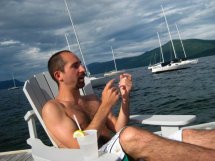 Society must be self-sustaining if it is to have the greatest chance of lasting, and thus the energy on which society runs must also be sustainable. Therefore, it would only make sense that our most powerful source of energy be used to power our society , and that the most abundant element be used as the medium to carry that energy throughout society in its transition to a more self-sustaining and lasting construct. It is of great importance that this transition happen smoothly if it is to be successful, and it must therefore take into consideration not only technical aspects, but social, political, and economic aspects of the transition. In so doing, many of the mistakes and pitfalls of past "social evolutions" can be avoided, and a more peaceful and prosperous society will be able to emerge.
Society must be self-sustaining if it is to have the greatest chance of lasting, and thus the energy on which society runs must also be sustainable. Therefore, it would only make sense that our most powerful source of energy be used to power our society , and that the most abundant element be used as the medium to carry that energy throughout society in its transition to a more self-sustaining and lasting construct. It is of great importance that this transition happen smoothly if it is to be successful, and it must therefore take into consideration not only technical aspects, but social, political, and economic aspects of the transition. In so doing, many of the mistakes and pitfalls of past "social evolutions" can be avoided, and a more peaceful and prosperous society will be able to emerge.
I began my studies at Tulane University, where I earned a BA in International Relations and Environmental Policy, with a Business minor in 2005. I then attended the Monterey Institute of International Studies where I earned a MA in International Environmental Policy in 2006. I then worked as an Environmental Coordinator for Southern California Edison, principally working on permitting and licensing of transmission lines for renewable energy projects, helping to "green the grid" in southern California. I began my doctoral studies at the University of Delaware's Center for Energy and Environmental Policy in the fall of 2008, and am focusing my research on using renewable and sustainable energy strategies for the achievement of sustainable development goals.
I like to spend as much time outside as possible, and thus count among my hobbies: frisbee, golf, tennis, sailing, wakeboarding, snowboarding, skiing, rock-climbing, sky-diving, running, cliff-jumping, trekking, camping, and traveling to new places. On a more social level, I try to find time and venues for swing-dancing, bowling, and listening to live music as often as possible.
Thomas Mangan
 In January of 2006, I made the decision to leave my career as a senior developer and database administrator in order to complete my
education. While I enjoyed the challenge of solving new problems every
day, I found the work unfulfilling, in that I wasn’t really
contributing anything to society. Having always been fascinated by
space, I chose to prepare for a career in cosmology, hoping to make
In January of 2006, I made the decision to leave my career as a senior developer and database administrator in order to complete my
education. While I enjoyed the challenge of solving new problems every
day, I found the work unfulfilling, in that I wasn’t really
contributing anything to society. Having always been fascinated by
space, I chose to prepare for a career in cosmology, hoping to make
some contribution to our knowledge of the universe. However, as my
education progressed, it became clear that there is a real, pressing
need for scientific advancement in the ways we produce, transmit,
store, and use energy, and my focus has shifted accordingly.
At the same time, it has been clear for some time that there is an
urgent need for policymakers with knowledge of both the science and
economy of energy. Although I returned to school for a scientific
degree, I strongly considered studying political science or economics.
Had it been logistically possible, I would have minored in one or both
of those fields while earning the BS in Physics. Our politicians need
advisors who not only understand the science, but can speak the
languages of both technology and policy, and the integrated curriculum
of the IGERT program is the perfect preparation for that sort of
flexibility.
As an undergraduate, my research consisted of simulating the effect of varying materials and layering models on the efficiency of thin-film photovoltaic devices. I am currently working at the Institute of Energy Conversion, developing methods of increasing the efficiency of thin-film solar cells while making them cheaper to manufacture.
In the long term, my goal is to pursue a career in academia. However,
as expressed above, my overriding desire is to have some positive
impact in whatever position I find myself. If I feel I can be more
useful in an industrial or advisory position, that is the path I will
choose.
Sarah Mastroianni
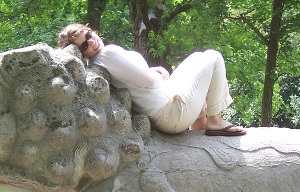 I completed my B.S. in chemical engineering at Lehigh University in 2008 where I also minored in environmental engineering and music. My interest in energy is what made me decide to go into chemical engineering in the first place. After completing an REU at the University of South Carolina doing fuel cell research my decision to pursue a career in energy was confirmed. I have long been concerned with the future of our planet from an environmental stand point. I believe that finding, and equally importantly implementing sustainable energy is currently where we can make the biggest and most important impact in ensuring our planet's preservation. I believe the solar hydrogen IGERT program will be incredibly beneficial to me in the pursuit of my goals. I was drawn by the interdisciplinary nature of the program since it is certainly going to take interdisciplinary efforts to develop and implement new energy technology. I am also incredibly excited about the educational focus and outreach programs. In order for our efforts to take effect we must educate the future generations.
I completed my B.S. in chemical engineering at Lehigh University in 2008 where I also minored in environmental engineering and music. My interest in energy is what made me decide to go into chemical engineering in the first place. After completing an REU at the University of South Carolina doing fuel cell research my decision to pursue a career in energy was confirmed. I have long been concerned with the future of our planet from an environmental stand point. I believe that finding, and equally importantly implementing sustainable energy is currently where we can make the biggest and most important impact in ensuring our planet's preservation. I believe the solar hydrogen IGERT program will be incredibly beneficial to me in the pursuit of my goals. I was drawn by the interdisciplinary nature of the program since it is certainly going to take interdisciplinary efforts to develop and implement new energy technology. I am also incredibly excited about the educational focus and outreach programs. In order for our efforts to take effect we must educate the future generations.
My research at the University of Delaware will focus on nanostructured photovoltaic materials using conjugated block copolymer assemblies. Other than being ridiculously excited about saving the world through sustainable energy I'm slightly obsessed with my alma matter, I love to sing, dance, cook (and bake), and travel to new and exciting places!
Michael Mayeda
Being sustainable in an unsustainable world is the overarching goal of our generation. It seems nearly impossible to imagine a future without the heavy use of dirty carbon sources but the fact that people are imagining is a sign of the times to come. The University of Delaware is one of many hubs beginning to innovate and proliferate concepts for a sustainable world with centers including the Energy Institute, Institute of Energy Conversion, CCST, CEEP, and many more.
I am attracted to the Solar IGERT group because I ultimately believe that the largest source of future renewable energy will be the sun. I am interested in developing improved efficiency photovoltaic cells as well as streamlining their production process. By improving efficiencies and cutting costs, PVs will be in a great position to help our unsustainable symptoms.
I was born and raised in Hawaii, a special case of an unsustainable region. Being a tropical heaven-on-earth, its primary industry is tourism. The technology is underfunded despite a large dependence on foreign sources of energy which need to be imported, thus increasing their prices. After I complete my graduate studies at the University of Delaware, I hope to work with some of the smaller start up companies in Hawaii to raise awareness of the energy crunch and market products that could alleviate the problem.
I received my B.S. in engineering at Harvey Mudd College with an emphasis in chemical engineering in 2008. I studied a semester at Kings College London, UK where I solidified my passion for the world's sport of football. I had the great opportunity to travel Europe, play for my school's football team, and support Arsenal. I would rather bodyboard waves than anything else in the world. I used to surf but almost drowned once and haven't gone back since. I plan to get my dosage of the outdoors with the Solar IGERT program. As you can see, there are many cool cats to be found.
Timothy Miller
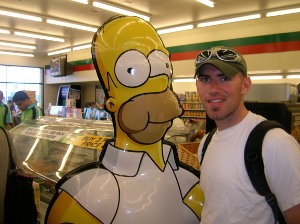 With high energy prices and rapid consumption of fuel in today's world coupled with the ever increasing world population, there needs to be alternative fuels and energies established and researched. But this cannot come from one direction only. The multitude of aspects to have to come from different areas, from research, design, implementation, economics and policy. This integrative nature was the most appealing aspect of the IGERT program. Hopefully, the results and research can help alleviate some of the problems of today's world.
With high energy prices and rapid consumption of fuel in today's world coupled with the ever increasing world population, there needs to be alternative fuels and energies established and researched. But this cannot come from one direction only. The multitude of aspects to have to come from different areas, from research, design, implementation, economics and policy. This integrative nature was the most appealing aspect of the IGERT program. Hopefully, the results and research can help alleviate some of the problems of today's world.
I received a BS in Chemistry with a minor in Physics from Siena College in May 2008. I gained experience in research at Siena in computational chemistry and helped repair a Nd:YAG laser as well as a nitrogen pumped dye laser. During the summer of 2007, I participated in the NSF's REU program at the University of Southern California where I worked on site-directed spin labeling of DNA molecules. For two two summers (2006 and 2008), I was a teaching assistant for Johns Hopkins' Center for Talented Youth. I am currently a first year graduate student in Andrew Teplyakov's research lab.
Roy Murray
 I have always had an interest in energy. The basic laws of energy conservation are what got me interested in studying Physics. While spending a semester studying at the University of Exeter in England I started realizing how priceless of a commodity energy really is. After working with nuclear power at Los Alamos Lab throughout undergrad, I wanted to work on novel, non-polluting energy sources. Growing up in the high deserts of New Mexico and dealing with constant sunburns, I am very aware of the power of the sun. It is the most powerful source of energy we have and not using it seems pointless. Turning the sun into clean, renewable electricity is the perfect solution to the world's energy and pollution problems. The process of doing this more efficiently and cheaper is what I hope to work on after grad school.
I have always had an interest in energy. The basic laws of energy conservation are what got me interested in studying Physics. While spending a semester studying at the University of Exeter in England I started realizing how priceless of a commodity energy really is. After working with nuclear power at Los Alamos Lab throughout undergrad, I wanted to work on novel, non-polluting energy sources. Growing up in the high deserts of New Mexico and dealing with constant sunburns, I am very aware of the power of the sun. It is the most powerful source of energy we have and not using it seems pointless. Turning the sun into clean, renewable electricity is the perfect solution to the world's energy and pollution problems. The process of doing this more efficiently and cheaper is what I hope to work on after grad school.
I received my BS in Physics in 2009 from New Mexico Tech in Socorro, New Mexico. After graduating I started a PhD program in Physics at University of Delaware. I am currently working on organic photovoltaics with Dr. Shah. We hope to develop a more efficient organic device that can be cheaply manufactured and help bring the high cost of solar energy down. When not working I am normally mountain biking, rock climbing, snowboarding or working on my house.
William Reid
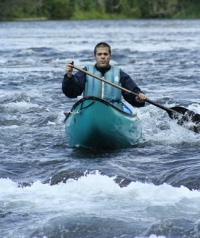 The growing global population, coupled with the increasing energy demands of growing countries such as China and India present many major social issues in the near future. In order to prevent having to make major changes that shape every day life in the future; it is important that we as society begin to make changes now. I am very excited about the opportunity through IGERT to help inform people about the need to make these changes; and the opportunity through research to help reduce the effect on people's daily life of the major changes that need to be made in the future.
The growing global population, coupled with the increasing energy demands of growing countries such as China and India present many major social issues in the near future. In order to prevent having to make major changes that shape every day life in the future; it is important that we as society begin to make changes now. I am very excited about the opportunity through IGERT to help inform people about the need to make these changes; and the opportunity through research to help reduce the effect on people's daily life of the major changes that need to be made in the future.
I graduated with a bachelor's degree in Materials Science and Engineering from The University of Alabama at Birmingham. Under the advisory of Dr. Matt Doty, I am researching the effect of coupling between quantum dots for photovoltaic applications. Quantum dots can possibly increase efficiencies of traditional semiconductor photovoltaic materials, as well as the efficiency of cheaper, lighter organic photovoltaic materials. Hopefully, through advancements in the field of renewable energy, we can circumvent some of the problems that are inevitable if we continue on our current path.
Meghan Schulz
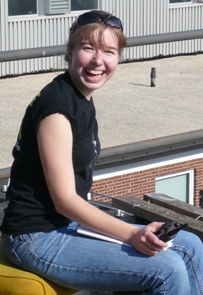 What problem would you devote your life to solving? I came to Delaware because, for me, that problem involves finding a way to live sustainably. Our society's easy access to fossil fuels has brought us a high standard of living, but at a steep environmental and social price. I am thrilled to be part of this new IGERT program, which will help train the next generation of energy leaders.
What problem would you devote your life to solving? I came to Delaware because, for me, that problem involves finding a way to live sustainably. Our society's easy access to fossil fuels has brought us a high standard of living, but at a steep environmental and social price. I am thrilled to be part of this new IGERT program, which will help train the next generation of energy leaders.
Here at UD, I work in Dr. Ismat Shah's group in Materials Science & Engineering. I synthesize and characterize thin-film nitrogen-doped TiO2 electrodes for use in photoelectrochemical (PEC) cells. These systems have the potential to generate large quantities of hydrogen fuel from water, using only clean power from the sun. I am also very interested in the political and social aspects of renewable energy, having double majored in chemistry and government at William & Mary. I hope to do an international internship during my IGERT tenure. After earning a PhD, I plan to work in industrial development of renewable energy technologies.
When I'm not trying to save the world from fossil fuels, I am usually singing, dancing, acting, or baking something decadent.
Alex Waegel
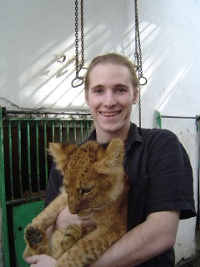 Energy is what makes the existence of life possible. Human society has long since moved beyond the basic use of energy for survival and in every year that passes the per capita usage of energy increases. the increase in per capita energy coupled with an expanding population has created innumerable challenges and crises that must be faced and must be solved if society as we know it can continue. The greatest problem we face is the dependence of society on fossil fuels, a limited and rapidly depleting energy source with tremendous environmental problems. Yet despite the nearly universal acknowledgment of these issue, society had struggled to shift to an alternative. Although alternatives do exist, they have generally been viewed as incapable of replacing the conventional energy system.
Energy is what makes the existence of life possible. Human society has long since moved beyond the basic use of energy for survival and in every year that passes the per capita usage of energy increases. the increase in per capita energy coupled with an expanding population has created innumerable challenges and crises that must be faced and must be solved if society as we know it can continue. The greatest problem we face is the dependence of society on fossil fuels, a limited and rapidly depleting energy source with tremendous environmental problems. Yet despite the nearly universal acknowledgment of these issue, society had struggled to shift to an alternative. Although alternatives do exist, they have generally been viewed as incapable of replacing the conventional energy system.
Hydrogen energy, especially hydrogen generated through solar energy, offers the potential to meet both the promises of an alternative energy society as well as the expectations the public has grown to expect from the conventional energy economy. But potential does not always become reality and there is a substantial danger that a hydrogen energy economy will not evolve along the path that will hydrogen to reach its full potential. Through the IGERT I plan to study those policy forces that will shape the developing hydrogen energy economy and hope to determine what must be done in order to encourage hydrogen to develop along that path.
I received an undergraduate degree in Physics from Drew University and gone through a M.A. program at the Center for Energy and Environmental Policy (CEEP), University of Delaware. I am currently in my second year of doctoral study at CEEP.


